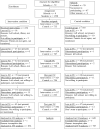Universal School-Based Depression Prevention 'Op Volle Kracht': a Longitudinal Cluster Randomized Controlled Trial
- PMID: 26404640
- PMCID: PMC4893378
- DOI: 10.1007/s10802-015-0080-1
Universal School-Based Depression Prevention 'Op Volle Kracht': a Longitudinal Cluster Randomized Controlled Trial
Abstract
The longitudinal effectiveness of a universal, adolescent school-based depression prevention program Op Volle Kracht (OVK) was evaluated by means of a cluster randomized controlled trial with intervention and control condition (school as usual). OVK was based on the Penn Resiliency Program (PRP) (Gillham et al. Psychological Science, 6, 343-351, 1995). Depressive symptoms were assessed with the Child Depression Inventory (Kovacs 2001). In total, 1341 adolescents participated, Mage = 13.91, SD = 0.55, 47.3 % girls, 83.1 % Dutch ethnicity; intervention group n = 655, four schools; control group n = 735, five schools. Intent-to-treat analyses revealed that OVK did not prevent depressive symptoms, β = -0.01, SE = 0.05, p = .829, Cohen's d = 0.02, and the prevalence of an elevated level of depressive symptoms was not different between groups at 1 year follow-up, OR = 1.00, 95 % CI = 0.60-1.65, p = .992, NNT = 188. Latent Growth Curve Modeling over the 2 year follow-up period showed that OVK did not predict differences in depressive symptoms immediately following intervention, intercept: β = 0.02, p = .642, or changes in depressive symptoms, slope: β = -0.01, p = .919. No moderation by gender or baseline depressive symptoms was found. To conclude, OVK was not effective in preventing depressive symptoms across the 2 year follow-up. The implications of these findings are discussed.
Keywords: Adolescence; Depression; Depressive symptoms; Universal prevention.
References
-
- Barrett PM, Farrell LJ, Ollendick TH, Dadds M. Long-term outcomes of an Australian universal prevention trial of anxiety and depression symptoms in children and youth: an evaluation of the Friends Program. Journal of Clinical Child and Adolescent Psychology. 2006;35:403–411. doi: 10.1207/s15374424jccp3503_5. - DOI - PubMed
-
- Beck AT. Cognitive theory and the emotional disorders. New York: International Universities Press; 1976.
Publication types
MeSH terms
Associated data
LinkOut - more resources
Full Text Sources
Other Literature Sources
Medical
Research Materials
Miscellaneous


